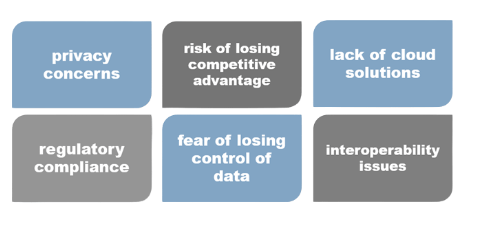Just make data sharing... fair
Mobility data sharing can enable broader use of available data, increase value and raise new businesses. Cities can benefit from this ecosystem by making more efficient usage of their hosted data, interoperating and connecting with other data to improve public infrastructure, traffic flows and people’s life.
MobiDataLab will run up until 2024. Credit: MobiDataLab
Mobility data is as heterogeneous as its use cases and the stakeholders that are contributing to them.
For example, a journey planning system that considers users’ needs requires a lot of additional data sets – from life traffic data, weather data, and static map data about the environment (green travel), to live data on noise, air quality, etc. This heterogeneity of data sets provided by different domains and stakeholders also brings a large variety of data formats, semantic design of data, and standards – in case the data is standardised at all.
Individual domains do provide standards, that are open and interoperable, such as data formats and services for spatial data by the Open Geospatial Consortium. Further examples are the GTFS standard for public transport schedules (reference), DATEX II for road traffic data, the OpenStreetMap key-value format for map data, and many more.
Some of the data formats are exchangeable, connectable, and replaceable. Especially the ones with semantic similarity. However, many formats come along with their own semantics, where the integration or the connection to other data is only doable with data interpretation – usually at the expense of data loss – or not possible at all.
Several data challenges have also been discussed in panels at the Dagstuhl seminar about Mobility Data Science and are reflected in the corresponding publication (Mokbel et al. 2022).

Data sharing obstacles.
Credit: MobiDataLab
The barriers to mobility data sharing
The technical complexity and the heterogeneity of stakeholders bring further complexity of limiting factors that need to be handled to enable mobility data sharing. The main barriers have been mentioned in ‘MobiDataLab - Labs for prototyping future mobility data sharing solutions’ at FOSS4G by Lauer et al. 2022.
Technical barriers can be solved by collaborative work on aligning standards. Besides this, new and enhanced cloud technologies can enable data sharing and build bridges between data producers and data users by connecting data to services and providing additional value to their users.
Privacy concerns can be managed by educational work, transparency, and privacy-enabling methods or privacy by design. Latest political initiatives, like the GDPR, force stakeholders to act more transparently and simultaneously educate data producers in managing their data.
The GDPR also ensures that the individual-produced data remains under the control of the data producer. Data sharing implies partnerships and more actors involved, which can raise the risk of losing the competitive advantage of using data. However, data sharing has the potential to enable further use cases and applications.
Even if individual monopolists will lose market shares due to newly available services, the overall market will grow (cf Data Sharing business and revenue models).
Enabling mobility data sharing can be very beneficial for cities. Mobility stakeholders are quite heterogeneous, but local authorities (as in cities, governments, and municipalities) are one of the main data providers. Infrastructural data, such as cadastral data, addresses, and road- and transport networks are usually maintained by cities or subcontracted partners. The users of the infrastructure are mobility companies, eg electric scooter rental companies, ride-share providers, and public transport companies.
Sharing data between stakeholders can support infrastructural planning and maintenance. It can help to adjust routes and improve customer experience. And it can trigger new ideas and raise new businesses by getting additional insights from combined data.

Barriers to data sharing.
Credit: Thierry Chevallier
The FAIR principle can help to enable mobility data sharing
In research, transparency, traceability, and repeatability are important to review and/or generate new findings on existing work. Based on this requirement, the FAIR principle (Wilkinson et al. 2016) for science was developed. FAIR stands for:
- Findable: Finding the data that you are looking for (eg via data catalogues)
- Accessible: Being able to access the data (eg via web services)
- Interoperable: Having the ability to load, read, and integrate the data (eg via open standards)
- Reusable: Using the data not just in one system, but for a broader set of use-cases
The FAIR principle and its guidelines for scientific data can also be useful for mobility data sharing. The principle addresses the challenges for mobility data and the guidelines are helpful to show the benefits of data sharing.
MobiDataLab as a showcase for mobility data sharing
The described challenges and barriers of data sharing are addressed in the EU H2020 project MobiDataLab, where the solution is built on four pillars:
1, State of the Art: Open Knowledge Base
Sharing knowledge about data and standards and providing an environment for learning, enhancing, and aligning data, services, use cases, and systems.
2. Proof of Value: Transport Cloud
Technical proof of concept as a cloud service that provides data and services to solve mobility challenges.
3. Put into Practice: Living and Virtual Labs
The practical interaction with users in virtual labs or living labs, where the Transport Cloud can show its functionality and contributors are being enabled to bring their ideas into reality.
4. Assess the Impact: Evaluation Framework
The instruments and tools that measure the impact of the mentioned initiative. This is implemented as a survey to get actors’ needs, a market analysis, a gap analysis (along the project), business - and revenue models and a data-sharing assessment framework.

Mobility data sharing use case.
Credit: MobiDataLab
Conclusion
As exemplified above, with some brave steps, it is possible to overcome several barriers to data sharing.
Tools and methods are already available, with the FAIR principle leading the way to enable mobility data sharing and the MobiDataLab project showing how to put such principle to practice.
However, this is just the beginning of a journey. Since data is and will grow, it is important to build bridges to enable the interaction between the stakeholders by aligning standards and providing value for actors within the value chain.
Bibliography:
Mokbel, Mohamed, et al. Mobility Data Science (Dagstuhl Seminar 22021). In: Dagstuhl Reports. Schloss Dagstuhl-Leibniz-Zentrum für Informatik, 2022
Wilkinson, M., Dumontier, M., Aalbersberg, I. et al. The FAIR Guiding Principles for scientific data management and stewardship. Sci Data 3, 160018 (2016).
Lauer et al. 2022. MobiDataLab - Labs for prototyping future mobility data sharing solutions at FOSS4G 2022, Florence
Benyayer, Louis-David 2022, Data Sharing business and revenue models, D3.4 MobiDataLab project
Click here to read the article in its original format.
About the authors
Johannes Lauer is Principal Technical Product Manager at HERE Technologies, a global platform and mapping company where he works on spatial data services, data integration and map making. He has a background in applied computer science and GIS and holds a PhD in GIScience from Heidelberg University.
